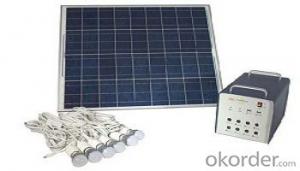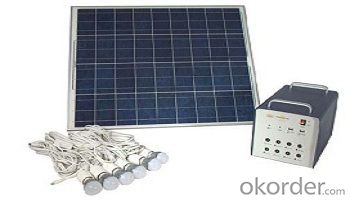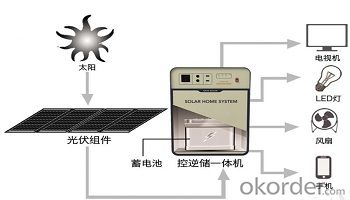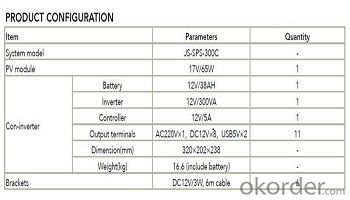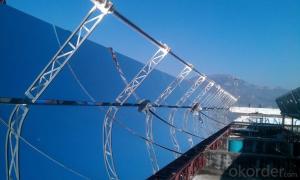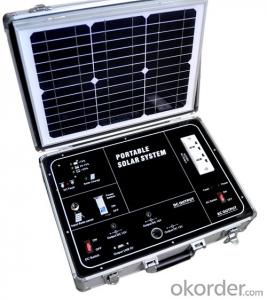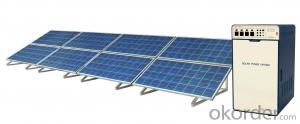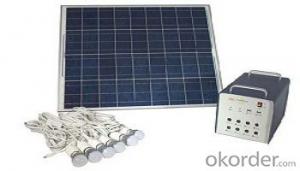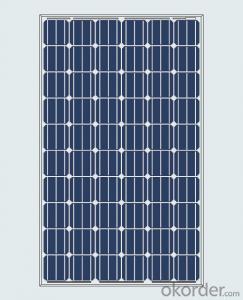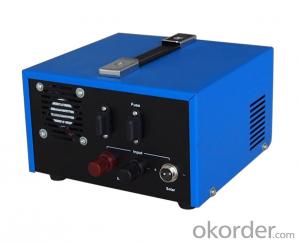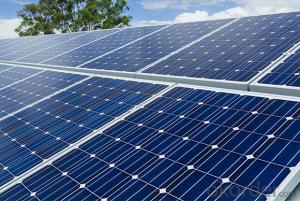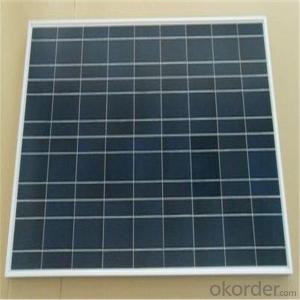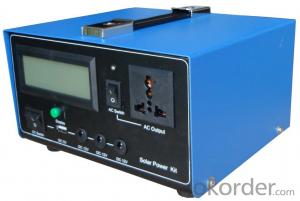Sun First Solar Energy Systems - SPS 300C SunPower Solar Module with LED Lighting
- Loading Port:
- China main port
- Payment Terms:
- TT OR LC
- Min Order Qty:
- 10 watt
- Supply Capability:
- 100000 watt/month
OKorder Service Pledge
OKorder Financial Service
You Might Also Like
Product Description:
Name: SPS-300C sunpower solar module
Solar power system provides alternating current and direct current, which is produced by the modules transforming solar power into power, to home lighting, household appliance and other DC appliance, such as cell phone and laptop.
Solar power system is widely used in area lack of power, for example house power supplying, monitoring, communication base, fire prevention in forest area, pasture and meadow, aquaculture etc.
Solar DC Lighting System
Multiple protection system, safe and reliable performance.
Integrated and portable design, easy operation.
DC5V, DC12V, AC220V output, wide range application.
Clean engergy, cycle use.
Packaging & Delivery:
Packaging Detail: Quantity of carton :3pcs Color Box size: 28.5*11.5*487.5px , 2.66kg/pc Carton size: 36.5*31*575px G.W/N.W: 8.7/8.0 kg
Delivery Detail: 25 working days according to order quantity
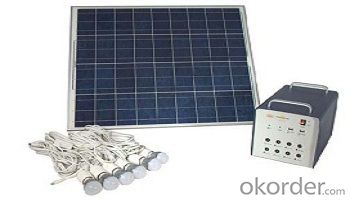
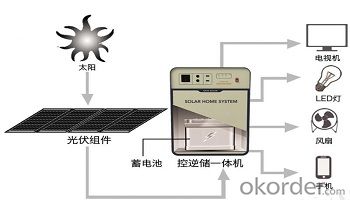
Advantages:
1.Solar Energy&green energy.
2. Easy to install, operate and maintain.
3. Ideal lighting products where normal electric is not convenient.
Packing details:
Quantity of carton :3pcs
Color Box size: 28.5*11.5*487.5px ,
2.66kg/pc
Carton size: 36.5*31*575px
G.W/N.W: 8.7/8.0 kg
Our services:
1. Sample: Sample is available. Please send us email about your detail consignee information: name, address, zip code and tel. Then we will contact you and send samples to you.
2. Small order: We can accept small order for this product. Please let us know your order quantity.
3. Customize: We accept OEM service and can customize products as customers' design.
4. After-sales service: We will give customers active feedback within 24hours after receive any of customers' questions.
- Q: What are the environmental impacts of solar energy systems?
- Solar energy systems have numerous environmental benefits, including reducing greenhouse gas emissions, minimizing air and water pollution, and preserving natural resources. However, the manufacturing and disposal processes of solar panels can generate some waste and require energy inputs. Additionally, land use for large-scale solar installations can impact local ecosystems. Overall, the environmental impacts of solar energy systems are significantly lower compared to conventional energy sources.
- Q: Can solar energy systems be used for powering electric fences?
- Yes, solar energy systems can be used for powering electric fences. Solar panels can generate electricity from sunlight, which can then be stored in batteries and used to power electric fences. This is a sustainable and cost-effective solution, especially in remote areas where access to electricity may be limited.
- Q: Are there any limitations to installing a solar energy system?
- Yes, there are several limitations to installing a solar energy system. Some of the key limitations include the availability of sunlight, the size and orientation of the roof or available space for installation, upfront costs, and the need for proper maintenance and monitoring. Additionally, the efficiency of solar panels can be affected by factors such as shading, temperature, and dust accumulation. Furthermore, grid connection and permitting requirements can also pose limitations depending on the location.
- Q: Can solar energy systems be used for powering transportation systems?
- Yes, solar energy systems can be used for powering transportation systems. Solar power can be harnessed through photovoltaic (PV) panels or concentrated solar power (CSP) systems to generate electricity. This electricity can then be used to power electric vehicles (EVs) or be converted into hydrogen fuel through electrolysis to power hydrogen fuel cell vehicles (FCVs). PV panels can be installed on vehicles or charging stations to directly charge the batteries of EVs. This technology is already being used in various electric cars and buses. Additionally, solar charging stations can be set up along highways or at designated parking lots to provide renewable energy for EVs on the go. For FCVs, solar power can be used to produce hydrogen through electrolysis, which splits water into hydrogen and oxygen using electricity. The hydrogen gas can then be stored and used to power FCVs, producing only water vapor as a byproduct. Solar-powered transportation systems offer numerous benefits. Firstly, they reduce dependence on fossil fuels, helping to mitigate climate change and reduce greenhouse gas emissions. They also contribute to energy independence and reduce reliance on imported oil. Solar energy is abundant, renewable, and widely available, making it a sustainable option for powering transportation. However, there are some challenges to consider. The efficiency of PV panels and hydrogen production technologies still need improvement to make solar-powered transportation more viable on a larger scale. Additionally, the initial cost of implementing solar energy systems for transportation infrastructure can be high, although the long-term operational costs are generally lower. Overall, solar energy systems have the potential to transform transportation by providing clean, renewable energy. As technology advances and costs decrease, solar-powered transportation will become increasingly feasible and widespread.
- Q: Can solar energy systems be used in powering amusement arcades or gaming centers?
- Yes, solar energy systems can definitely be used to power amusement arcades or gaming centers. Solar energy systems convert sunlight into electricity, providing a clean and renewable source of power. By installing solar panels on the roofs of these facilities or in nearby areas with sufficient sunlight exposure, the generated electricity can be used to run the arcade machines, gaming consoles, lighting, air conditioning, and other electrical equipment within the establishment. In addition to reducing electricity bills, solar energy systems also have long-term cost savings and offer a sustainable solution that aligns with the growing demand for environmentally friendly operations.
- Q: Can solar energy systems be used in conjunction with energy storage systems?
- Yes, solar energy systems can be effectively used in conjunction with energy storage systems. Solar energy systems generate electricity during daylight hours, and any excess energy generated can be stored in energy storage systems such as batteries. These batteries can then be used to power homes or businesses during periods when solar energy generation is limited, such as at night or during cloudy weather. This combination of solar energy systems and energy storage systems allows for a more consistent and reliable supply of electricity, reducing dependence on the grid and promoting greater sustainability.
- Q: Can solar energy systems reduce electricity bills?
- Yes, solar energy systems can reduce electricity bills. By harnessing the power of the sun to generate electricity, homeowners and businesses can significantly offset their reliance on grid-supplied electricity, resulting in lower utility bills.
- Q: Can solar energy systems be used for powering telecommunications towers or antennas?
- Certainly, solar energy systems are capable of powering telecommunications towers and antennas. Solar power presents a sustainable and dependable energy source that can be harnessed to supply electricity for various purposes, including the operation of telecommunications infrastructure. To function efficiently, telecommunications towers and antennas require a steady and uninterrupted flow of electricity. However, conventional methods of powering these structures, like diesel generators, not only incur high expenses but also contribute to pollution and carbon emissions. Solar energy systems, on the other hand, offer a cleaner and more economical alternative. By installing solar panels on or near the telecommunications tower, sunlight is captured and transformed into electricity through photovoltaic cells. This electricity can be utilized directly to power the tower's equipment or stored in batteries for use during periods of low sunlight. Through the adoption of solar energy, telecommunication companies can reduce their reliance on fossil fuels and decrease operational costs. Furthermore, solar energy systems can be implemented in remote areas where accessing the grid or establishing a reliable power supply can be challenging. In such instances, solar power can provide a viable solution, enabling telecommunication companies to expand coverage and connectivity to underserved regions. In conclusion, solar energy systems prove to be an exceptional option for powering telecommunications towers and antennas. They present a sustainable and cost-effective solution while minimizing environmental impact. With advancements in solar technology, the efficiency and reliability of solar power systems continue to improve, establishing them as a viable choice for the telecommunications industry.
- Q: Can solar panels be installed on RVs or boats?
- Yes, solar panels can be installed on both RVs and boats. In fact, they are becoming increasingly popular as a sustainable and efficient way to generate electricity while on the move. Solar panels can provide a reliable source of power for various appliances and equipment used in RVs and boats, such as lights, fans, refrigerators, and even charging electronic devices. The panels are typically mounted on the roof or deck, where they can capture sunlight and convert it into usable energy. This allows RV and boat owners to reduce their reliance on traditional power sources and have greater freedom to explore remote areas without the need for electrical hookups. Additionally, solar panels on RVs and boats are environmentally friendly and can help reduce carbon emissions. However, it is important to consider the power requirements and available space before installing solar panels, as well as ensuring proper installation and maintenance to maximize their efficiency and longevity.
- Q: Can solar energy systems be used for powering manufacturing facilities?
- Yes, solar energy systems can be used for powering manufacturing facilities. Solar power systems can generate electricity to meet the energy demands of manufacturing processes, reducing reliance on traditional fossil fuel-based electricity. This renewable energy source can contribute to sustainable and environmentally friendly manufacturing practices while potentially lowering operational costs in the long run.
Send your message to us
Sun First Solar Energy Systems - SPS 300C SunPower Solar Module with LED Lighting
- Loading Port:
- China main port
- Payment Terms:
- TT OR LC
- Min Order Qty:
- 10 watt
- Supply Capability:
- 100000 watt/month
OKorder Service Pledge
OKorder Financial Service
Similar products
Hot products
Hot Searches
Related keywords
